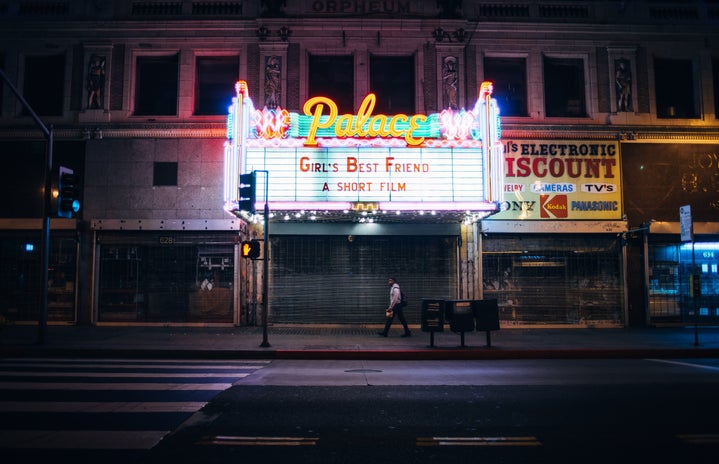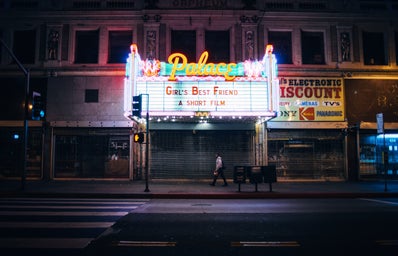On September 20th, A24 held a press conference for their new documentary Boys State, premiering on Apple TV+, fielding questions from students working for the press across college campuses, from Harvard to UC Boulder to the University of Georgia. The A24 correspondent, Lisa Richie, noted it was the biggest academic Zoom call she had ever been a part of for a film’s press conference. The documentary tells the story of 2018’s Texas Boys State, where over a thousand high school boys came together for a week in a political and social experiment of building a democracy from the ground up. Set in the political underbelly of Texas, Boys State is a microcosm of how politics function and expresses concerns for today’s democracy. On the Zoom call were the filmmakers Jesse Moss and Amanda McBaine, A24 representatives, moderator Cole Jackson of Vanderbilt University, student press from around the country, and three of the film’s subjects: Ben Feinstein, Robert MacDougall, and Steven Garza.
Questions centered around the boys’ performances, how the crew filmed non-invasively, and the documentary’s message on democracy.
When asked about filming with the boys, Jesse and Amanda said, “It’s really a testament to them because what you’re responding to is how open they were to us and being a part of this journey, both of Boys State and a part of this documentary. You can’t force that. You have to be met in the middle, and they all wanted to be participating in the film. We can’t control the documentary gods but they shone down on us, and we got very lucky. They all turned out to be as complicated, interested, and remarkable as we wanted them to be.” Robert commented on the process of being filmed: “I like to think back that the camera crew didn’t have an effect, but it almost certainly did. While it wasn’t necessarily guiding my words, it was like having dogs at your heel barking at you to go forward. I still acted like myself and executed my vision, but the added presence of pushing forward was present.” Steven agreed, also saying, “I’m sure the cameras had somewhat of an effect on the experience, but these thousand kids never did Boys State before, so they don’t know what Boys State is like without cameras. The camera crew felt like it was part of the process, and they followed what looked most interesting. The camera definitely disappeared into the background by the second or third day; the drama was plenty to focus on! My experience wouldn’t have changed much without cameras, and I still would’ve said what I wanted to. Jesse and Amanda still would’ve had a movie to make, only without my voice. I ended up losing the Gubernatorial Election, even though I had the camera crew, to Eddy who doesn’t show up halfway through the film, so all the cameras did was really make sure we were doing something.”
Jesse and Amanda also discussed remaining behind the camera though still being deeply immersed in the storytelling. Amanda said, “We try to be a fly on the wall, but we aren’t. We had six different camera crews going around campus. The cameras were very close to candidates giving speeches, so while we weren’t invisible, we’ve been doing this for many years and tried to be as non-invasive as possible. The Boys State program had its own news run by boys with much less experience, and when we think about the news in the real world, it isn’t surprising to see cameras at the experience.” Jesse added, “Without media attention, candidates cannot survive in real politics. Robert’s description of us as dogs nipping at heels is accurate, and I love it! It’s a very active relationship between the crew and subjects where we aren’t just observing. You get to know who you’re talking to, and it’s much deeper than a scientific relationship. The most active we got was when we did one-on-one interviews away from the politics just to ask the boys what they were going through. It wasn’t a big part of the boys’ experience at the program, but it was a large part of our doc.” As they say, the media shapes politics all the time, so why would it be any different for a documentary representing that?
A main focus of the press conference was what the documentary was saying about today’s politics, particularly relevant because of our proximity to the tumultuous 2020 presidential election. The documentary had a much smaller, but still divisive, iteration of the game-like and conflict-riddled polarizing elections we’ve come to expect as a result of the past few election seasons. But as Ben said, the whole point wasn’t even about the elections because “what you don’t see in the documentary is the sense of patriotism, civic duty, and understanding of how your democracy works.” He added that there is a special “value of bringing together Texans from all walks of life (rural, urban, liberal, conservative, rich, poor) and putting them in a single room.” In every measure, you’re with people you may not agree with, so ultimately the point of the program is a crash course in civic education.” Civic engagement, how to act in a political space, and the importance of working together ran true in other minds as well. Ben continued, “If you have those conversations to get to know the people around you [and] on the other side, you can make progress in politics.” Steven echoed this sentiment: “Can we put aside labels and sit down with some sort of agreement? I think I was able to do it at Boys State and wish more politicians around the country would sit down with their opposition and go home knowing they did something good for the American people.”
At the heart of the documentary is also a message to educate yourself on politics. It’s a call for political action, especially for the youth, since they are the political generation of the future—the ones who can sit down and make progress happen. This is not an easy thing to accomplish, but as filmmaker Amanda McBaine phrases it, “Boys State encourages viewers to have infinite hope” despite “finite disappointments.” Jesse Moss noted the dire need for conversation and increased engagement in democracy today because “democracy is not a spectator sport” and only works if everyone is involved.
Robert made an important point for the discussion: “Politicians are often so disassociated with those they represent, and if they took the time to talk to their constituents, the cold indifference of modern politics could be replaced with true empathy, caring, and knowledge of what people want to happen,” especially if it starts with youth in local politics.
So, change starts with YOU. Please register to vote in Georgia at Rock the Vote, Voter Participation, the My Voter page, or on the Secretary of State’s registration system. At these sites, you can also look up deadlines, locations, how to volunteer at polling offices, and how to send absentee ballots.
Boys State will be screened Thursday, September 24th at 7pm by A24 at UGA in partnership with Her Campus at UGA. RSVP here. Be sure to follow and like A24 at UGA on Facebook to hear more updates about A24 at UGA events.
BOYS STATE is an Apple Original Films and A24 Release. Now available to stream on Apple TV+.



